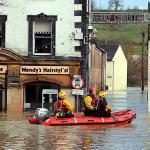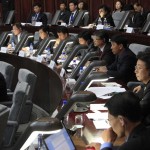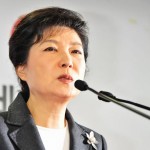- DETERRENCE: A New Use for Nuclear Weapons: Hunting Rogue Asteroids
- DPRK: N. Korea Holds Rare Meeting of Military Officers
- ENERGY SECURITY: UN Warms to Idea of Using Giant Mirrors in Fight Against Climate Change Effects
- GOVERNANCE AND CIVIL SOCIETY: Park Seeks a New Image for Her Father’s Saemaul
- CLIMATE CHANGE ADAPTATION: The National Adaptation Programme: Making the Country Resilient to a Changing Climate
- AUSTRAL PEACE AND SECURITY: Re-thinking Colonialism to Prepare for the Impacts of Rapid Environmental Change
DETERRENCE: A New Use for Nuclear Weapons: Hunting Rogue Asteroids, A persistent campaign by weapons designers to develop a nuclear defense against extraterrestrial rocks slowly wins government support, D. Birch, Center for Public Integrity, October 16, 2013
Defending Earth against low probability asteroidal impacts that generates tsunamis, urban and habitat blow-down, etc could require nuclear weapons. The US and Russia have agreed to study this issue.
- Predicting Apophis’ Earth Encounters in 2029 and 2036, J. Giorgini et al, Icarus, 193, 2008, update April 2013, pp. 1-19
- Meteor crash in Russia, 1500 people injured! Ural, Chelyabinsk, New Video Part 4, February 16, 2013
- Defending Planet Earth: Near-Earth Object Surveys and Hazard Mitigation Strategies, US National Research Council, 2010, [PDF, 34 mb]
DPRK: N. Korea Holds Rare Meeting of Military Officers, Yonhap News Agency, Globalpost, (22 October 2013)
Some may consider North Korea’s efforts to simultaneously reach out and yet strengthen domestic political education as leading indicators of change. The effectiveness of both efforts will only be visible in the future. However, the relative stability is certainly welcome. Also the more connections North Korea makes and rebuilds, the more relief valves exist in the future for North Korea to express displeasure.
- President (of Mongolia) to visit North Korea, English News Mongolia (22 October 2013)
- Chinese Vice-President meets DPRK youth friendship delegation, (North Korea) Central News Agency, (19 October 2013)
- Canadian among experts in North Korea for rare international conference. The Canadian Press (16 October 2013)
 ENERGY SECURITY: UN Warms to Idea of Using Giant Mirrors in Fight Against Climate Change Effects, Pilita Clark, Financial Times [20 September 2013]
ENERGY SECURITY: UN Warms to Idea of Using Giant Mirrors in Fight Against Climate Change Effects, Pilita Clark, Financial Times [20 September 2013]
Short of funds for many of its other activities, UN finds it easy to dream up gigantic mirrors while avoiding looking at a mirror itself. If not carbon capture, solar radiation management, an idea that was around in mid-1970s to fight global cooling. Others demand leaving fossil fuels in the ground. One step toward that was proposed by the USEPA recently, and is sure to be challenged in the courts. Liberal Democrats in UK have switched their allegiance to nuclear power.
- Scientists studying solar radiation management as a way to cool planet, Lenny Bernstein, Washington Post [8 September 2013]
- Major fossil fuel reserves must be left in the ground, senior diplomat warns: Mary Robinson says governments must confront this harsh reality if runaway emissions are not to threaten the climate, Fiona Harvey, Guardian (UK) [23 September 2013]
- Lib Dems vote to accept nuclear power, Rowena Mason, Guardian (UK) [14 September 2013]
- Challenges await plan to reduce emissions, Matthew L. Wald and Michael D. Shear, New York Times [20 September 2013]
GOVERNANCE & CIVIL SOCIETY: Park Seeks a New Image for Her Father’s Saemaul, Heo Jin, Joongang Ilbo (21 October 2013)
ROK President Park has proposed a new direction for the Saemaul Movement, a hallmark of the Park Chung-hee regime, calling for a movement based on community and creativity. However, Saemaul also stirs memories of former President Park’s Yushin policies, leading some to question whether the current administration should tout the movement. The ROK plans to export its experience of Saemaul to developing countries, in cooperation with the UNDP.
- Pres. Park should leave the Saemaeul movement in the past, Hankyoreh (22 October 2013)
- S. Korea agrees with UNDP to share rural development know-how, Yonhap (24 September 2013)
 CLIMATE CHANGE ADAPTATION: The National Adaptation Programme: Making the Country Resilient to a Changing Climate, Presented to Parliament pursuant to Section 58 of the Climate Change Act 2008, London: The Stationery Office, UK (July 2013) [4.51 MB, PDF]
CLIMATE CHANGE ADAPTATION: The National Adaptation Programme: Making the Country Resilient to a Changing Climate, Presented to Parliament pursuant to Section 58 of the Climate Change Act 2008, London: The Stationery Office, UK (July 2013) [4.51 MB, PDF]
If adapting to climate change is in the private interests of an individual and an organization then it should occur naturally and without the government’s intervention (except in areas of the government’s responsibility). This is already happening in some cases. However, barriers to adaptation do exist. To take advantage of the economic and social benefits of adaptation we need to overcome these barriers.
- Policy paper – UK climate change risk assessment: Government report, Department for Environment, Food and Rural Affairs, London: The Stationery Office, UK (January 2012) [1.32 MB, PDF]
- Policy brief – Adaptation in the UK: a decision-making process, Nicola Ranger et al., Grantham Research Institute on Climate Change and the Environment and Centre for Climate Change Economics and Policy, UK (September 2010) [3.61 MB, PDF]
AUSTRAL PEACE AND SECURITY:
Re-thinking colonialism to prepare for the impacts of rapid environmental change, Nicholas James Reo and Angela K. Parker, Climatic Change (2013) 120:671–682
Historical analysis of linked ecological and societal rapid changes may help determine pathways to desirable futures. By the close of King Phillip’s War in 1676 New England was transformed from a heterogeneous patchwork of ecosystems supporting diverse food systems into a depauperate hash of fields and forests susceptible to pest outbreaks and erosion. The concept of coupled human and natural systems (CHANS) helped quiet the noise in the chaotic colonial history.
- Preventing and resolving future climate and natural resource-related conflicts in the Zambezi basin: a study of Bulawayo and Chinde districts, Tigere Chagutah, Southern Africa Institute for International Affairs, Occasional Paper 155 (September 2013)
- Climate change to have double impact – study, Nafeez Ahmed, Earth Insight, Guardian blog (18 September 2013)
- Climate science in climate security scenarios, Kirsty Lewis, Climatic Change (published online 11 October 2013)
The Nautilus Peace and Security Weekly Report presents articles and full length reports each week in six categories: Austral security, nuclear deterrence, energy security, climate change and security, the DPRK, climate change adaptation and governance and civil society. Our team of contributors carefully select items that highlight the links between these themes and the three regions in which our offices are found—North America, Northeast Asia, and the Austral-Asia region.
Subscribe to NAPSNet to receive free weekly email reports
Editor
- Saegan Swanson (while Arabella Imhoff is on leave)
Contributors
- Deterrence: Peter Hayes
- Governance and Civil Society: Dyana Mardon
- Climate Change Adaptation: Saleem Janjua
- DPRK: Roger Cavazos
- Energy Security: Nikhil Desai
- Austral Peace and Security: Richard Tanter





